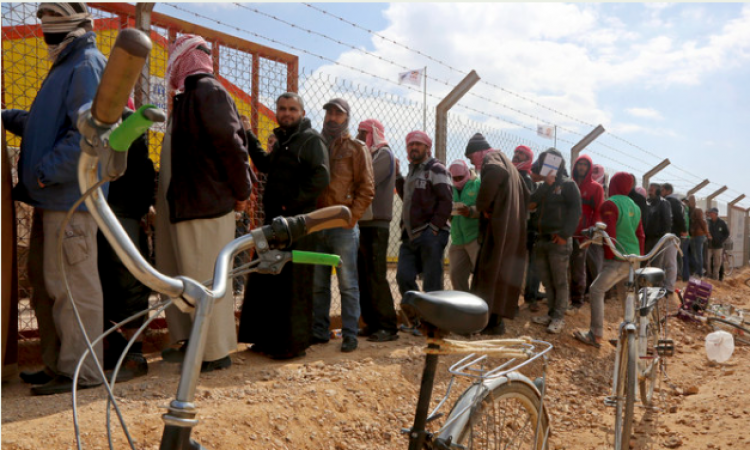
Beirut: Due to what it called a "unprecedented funding crisis," the United Nations food agency announced Tuesday that it will cut the amount of monthly cash aid given to the 120,000 Syrian refugees living in camps in Jordan.
With a population of 11 million, Jordan is home to 1.3 million Syrian refugees, the majority of whom reside in camps spread throughout the country. The cash assistance is relied upon by almost half of the refugees in the two biggest camps in Jordan, Zaatari and Azraq.
Jordanian officials have issued warnings that their country is unable to fill the gap left by foreign donors.
The World Food Program made the announcement after announcing last week that it would gradually stop providing aid to all 50,000 refugees in Jordan. Initially, the program had covered 465,000 people.
Also Read: Four T-6C training aircraft are delivered by the US to Tunisia
Nearly 30% of refugees who are still enrolled in the program after it has ended completely will receive smaller cash payments. According to WFP, the monthly cash allowance would drop from $32 to $21.
Due to donor fatigue, the financial impact of the coronavirus pandemic, and the conflict between Russia and Ukraine, international humanitarian organizations and UN agencies have struggled for years to meet budgetary requirements for their assistance in Syria and for Syrian refugees in neighboring countries.
With the aid of allies Russia and Iran, Syrian President Bashar Assad's government was able to retake large portions of territory, but the crisis in the country's war-torn nation is still at a standstill.
Also Read: Israel's Latest Airstrikes on Syria Wound Two Soldiers
The WFP representative for Jordan, Alberto Correia Mendes, said, "As funding dries up, our hands are tied.
The agency stated that even with the current cuts, it still has a $41 million funding gap to fill and may need to take further action.
Millions of Syrian refugees living in Lebanon and Turkey, where anti-refugee rhetoric and calls for mass deportations have increased in light of the country's economic and political unrest, have also been impacted by funding cuts.
The 13-year-old civil war in Syria that started as an uprising has claimed nearly 500,000 lives and uprooted half of the country's 23 million residents.
At this year's annual donor conference on Syria in Brussels last June, Jordan's foreign minister, Ayman Safadi, raised concerns about his country's inability to close funding gaps. He reiterated his warning that "refugees will suffer" last week.
This is not Jordan's fault. He said, "It is on those who are cutting support. "The world has a duty to give refugees a dignified existence. As the host nation, it is not solely ours.
Dominik Bartsch, a representative of the UN agency for refugees in Jordan, claimed that the reduction in aid has forced organizations to focus only on the most vulnerable families, leaving many others in need without assistance.
According to Bartsch, "there is an immediate risk that the situation is reverting to a humanitarian crisis with serious ramifications for refugees and host communities."
Also Read: UN: The world needs to get ready for more severe heatwaves
Safadi called for funding for Syria's battered infrastructure during a July 4 visit to Damascus, where he also met Assad, to hasten voluntary refugee returns. Jordan has also led regional negotiations with Damascus to find a peace settlement.
The West continues to impose sanctions on Syria, including for alleged war crimes and drug trafficking, and unlike Arab nations, it has not endorsed normalizing relations with Assad or provided funding for reconstruction.